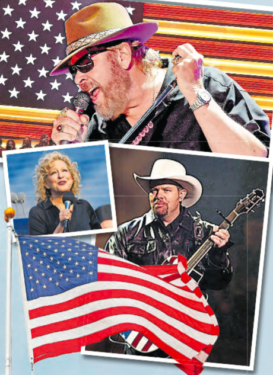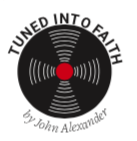
Songs and anthems inspired by the Sept. 11 attacks
It took over two months for the music industry to address the horrific attacks that occurred on 9/11. People were confused, angry, and still in shock over what occurred on that fateful day, until a country singer from Newnan, Ga., helped put it all into perspective for us with a song that resonated throughout the country and the world.
 Alan Jackson performed his self-penned composition “Where Were You (When the World Stopped Turning),” for the first time live on television on Nov. 7, 2001, at the Country Music Awards presentation. It became the first song to directly address the terrorist attacks on the country — specifically how the event was perceived by one individual.
Alan Jackson performed his self-penned composition “Where Were You (When the World Stopped Turning),” for the first time live on television on Nov. 7, 2001, at the Country Music Awards presentation. It became the first song to directly address the terrorist attacks on the country — specifically how the event was perceived by one individual.
“Where Were You” was Jackson’s fiftieth single on the country chart where he had already amassed 18 No. 1 hits. Jackson was a traditional country artist who proudly sang of his small-town Southern roots and the importance of God, faith, and family in his life. It was that faith at the heart of this song, as he explained in the lyrics, “I’m just a singer of simple songs, I’m not a real political man / I watch CNN, but I’m not sure I can tell you the difference between Iraq and Iran / But I know Jesus and I talk to God and I remember this from when I was young / Faith, hope, and love are the good things He gave us, and the greatest is love.”
Jackson’s words were poetic in their sheer honesty and, while he admittedly may not be a “real political man,” his words struck a nerve with listeners who were just as confused as he was by exactly what transpired on Sept. 11.
While “Where Were You” was the first new song to directly address those historic events, listeners also found comfort in older, more familiar songs that helped them through the immediate aftermath. For example, Lee Greenwood’s patriotic anthem, “God Bless the USA,” took on added significance and reached both the pop and country Top-20 just three weeks after the attacks. The song had originally reached No. 7 on the country chart when it was first released in 1984. Politics were brushed aside as all Americans were unified in their grief and anger. Greenwood’s song was the perfect anthem that combined love for our country, from coast to coast, with an inspirational note that only God and our faith would get us through the most difficult situations.
The opening lines seemed to directly address the worst scenario: “If tomorrow all the things were gone I worked for all my life, and I had to start again with just my children and my wife / I’d thank my lucky stars to be livin’ here today, ’cause the flag still stands for freedom, and they can’t take that away.”
The panoramic lyrics carry us from “the lakes of Minnesota to the hills of Tennessee / across the plains of Texas, from sea to shining sea.” It’s a message song that doesn’t rely on partisan views. The song somehow captured the country’s need to stand strong in the face of ultimate adversity.
Similarly, Country Music Hall of Famer Hank Williams Jr. updated his 1982 hit, “A Country Boy Can Survive,” as a paean to the resiliency of the American spirit that can overcome any obstacles. Revised by Williams as “America Will Survive,” the song had originally detailed the tragic situation of a friend of the singer who lost his life after being mugged at knifepoint in New York City. It now included additional lyrics alluding to 9/11: “Yeah, we have toughed it out a time or two / these are dark days but we’re going to pull through.” The updated version peaked on the country chart in November 2001.
That same month, country singer-songwriter Toby Keith reached No. 1 on the country chart and No. 25 on the pop chart with “Courtesy of the Red, White, and Blue (The Angry American).” This vigilant song directly addressed 9/11 in the lines: “Now this nation that I love has fallen under attack / a mighty sucker punch came flyin’ in from somewhere in the back.” Some criticized it for being militaristic, with the singer warning the attackers, “You’ll be sorry that you messed with the U.S.A. / ’Cause we’ll put a boot up your ass, it’s the American way.” Keith’s father had died in a car accident six months prior to the attacks; the lyrics of the song describe how he imagined his father would have reacted to 9/11.
Keith scored another No.1 hit in 2003 with “American Soldier,” which celebrated the heroic sacrifices of servicemen throughout our history, inspired by the men who were then going off to fight for our freedom in Iraq. The powerful ballad emphasizes the high price paid for that freedom in the lines: “Oh, and I don’t want to die for you, but if dyin’s asked of me / I’ll bear that cross with honor, ‘cause freedom don’t come free.”
When America responded to the terror attacks by sending troops to Afghanistan to fight al-Qaeda and remove the Taliban from power, the music community felt compelled to address the situation in song. Daryl Worley reached the top of the country chart in March 2003 with “Have You Forgotten?” The song supported America’s efforts to topple the Taliban by posing the question, “I hear people saying we don’t need this war / I say there’s some things worth fighting for.” He expresses his views in the powerful lines: “Have you forgotten how it felt that day to see your homeland under fire and her people blown away / Have you forgotten when those towers fell?” The song, co-written by Worley and Wynn Varble, spent seven weeks at No. 1 on the country chart and also climbed to No. 22 on the pop chart.
Songwriter Kristy Jackson, who scored a Top-5 country hit with Reba McEntire’s “Take Me Back,” also wrote “Little Did She Know (She Kissed a Hero)” — a song that helped raise $30,000 for 9/11-related charities. The song describes the heartbreaking tragedy suffered when a husband kisses his wife and leaves home on the morning of the attacks to fly to Los Angeles, never to return again. Thanks to the heroic actions of the passengers on board United Airlines Flight 93, the hijacked plane was forced down in Shanksville, Pa., before it could reach its target in Washington, D.C. The song’s lyrics praise the brave individuals who sacrificed their lives: “Little did she know she’d kissed a hero, though he’d always been an angel in her eyes / Putting others first, it’s true, that’s what heroes always do, now he doesn’t need a pair of wings to fly.”
“The Wind Beneath My Wings” also made a resurgence at the time with its lyrics of love and devotion to someone the singer thinks of as a hero. All the loved ones who perished were heroes in their families’ eyes and the hearts of everyone who was left reeling from the loss. It was a truly cathartic song for the moment, letting the lost loved ones know how treasured they were: “Did you ever know that you’re my hero? You’re everything I wish I could be.” This was originally a No. 4 country hit for singer Gary Morris in 1983, followed by a stellar cover by Gladys Knight that same year under the title “Hero.” Ultimately, the song was a No. 1 hit for Bette Midler in 1989.
Tim McGraw hit a collective nerve with his gut-wrenching ballad, “If You’re Reading This,” which he performed live for the first time at the 2007 Academy of Country Music Awards. It is written as a letter from a soldier to his wife. Should he not return from battle, he asks, “So lay me down in that open field out on the edge of town and know my soul is where my Mama always prayed that it would go / If you’re reading this, I’m already home.” The song culminates with the powerful lines, “Just remember I’m in a better place where soldiers live in peace and angels sing ‘Amazing Grace.’” With its allusion to an open field, not unlike the open field Flight 93 struck in Shanksville, the song served as a heartfelt tribute to all those brave heroes who gave their lives in battle after 9/11.
Twenty years later, we can look back at the nightmare that we all woke up to that fateful day and the songs which helped us endure the aftermath — and how those songs truly made a difference in our lives. Alan Jackson may choose to portray himself as a “singer of simple songs,” but in fact, those songs were essential to our coming to terms with the agony of it all. In “Where Were You,” when he asks, “Did you call up your mother and tell her you love her / Did you dust off that Bible at home,” chances are that’s precisely what we all did. We might have turned on an old “I Love Lucy” rerun, as Jackson did, to remind us of a gentler and sweeter time in our lives. We all did things we never thought we would do, and thanks to artists like Alan Jackson and the unforgettable anthems of 9/11, we can now be reminded of how we persevered during that devastating time and how with God’s grace we hope to avoid anything like it again.
